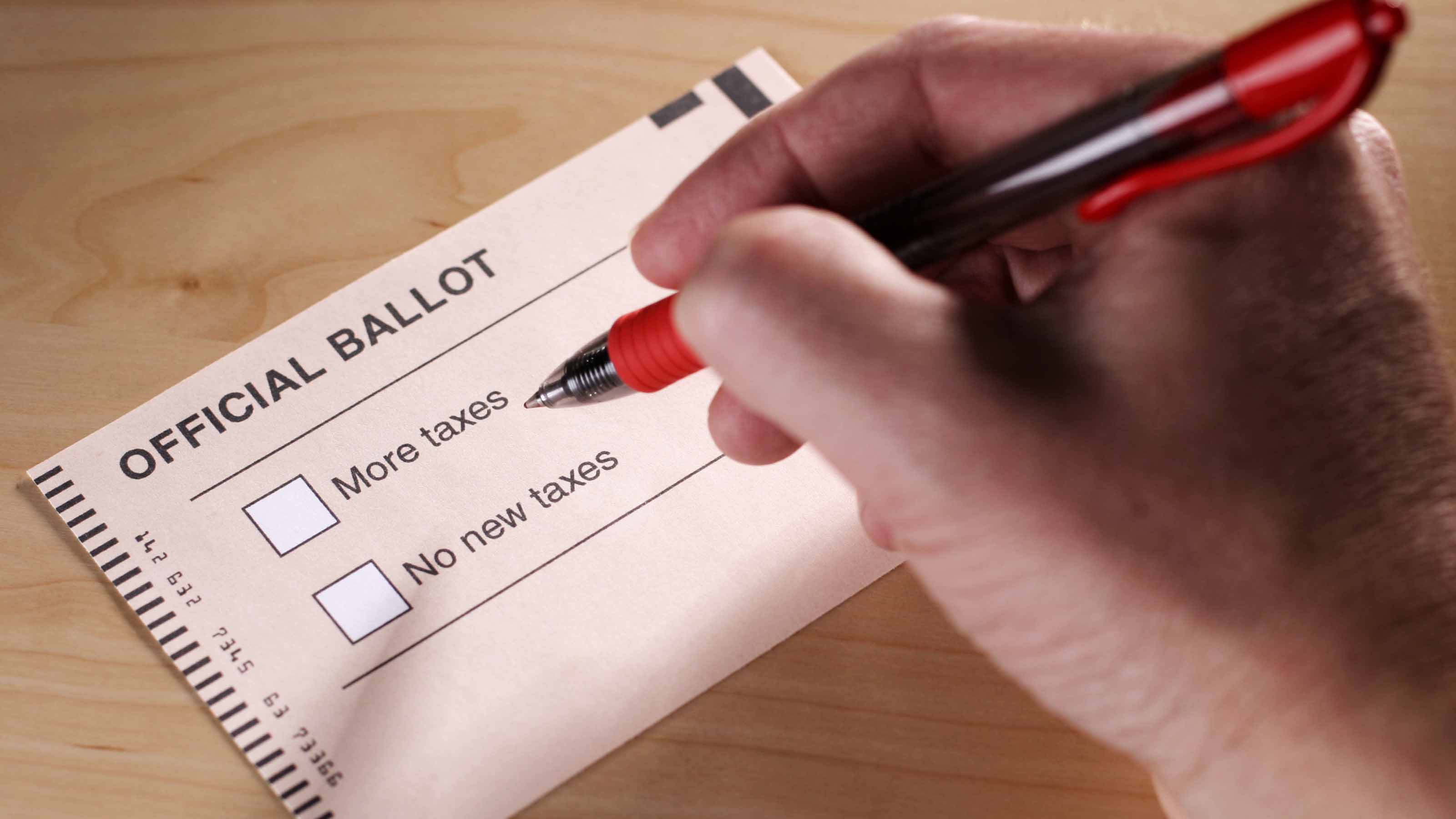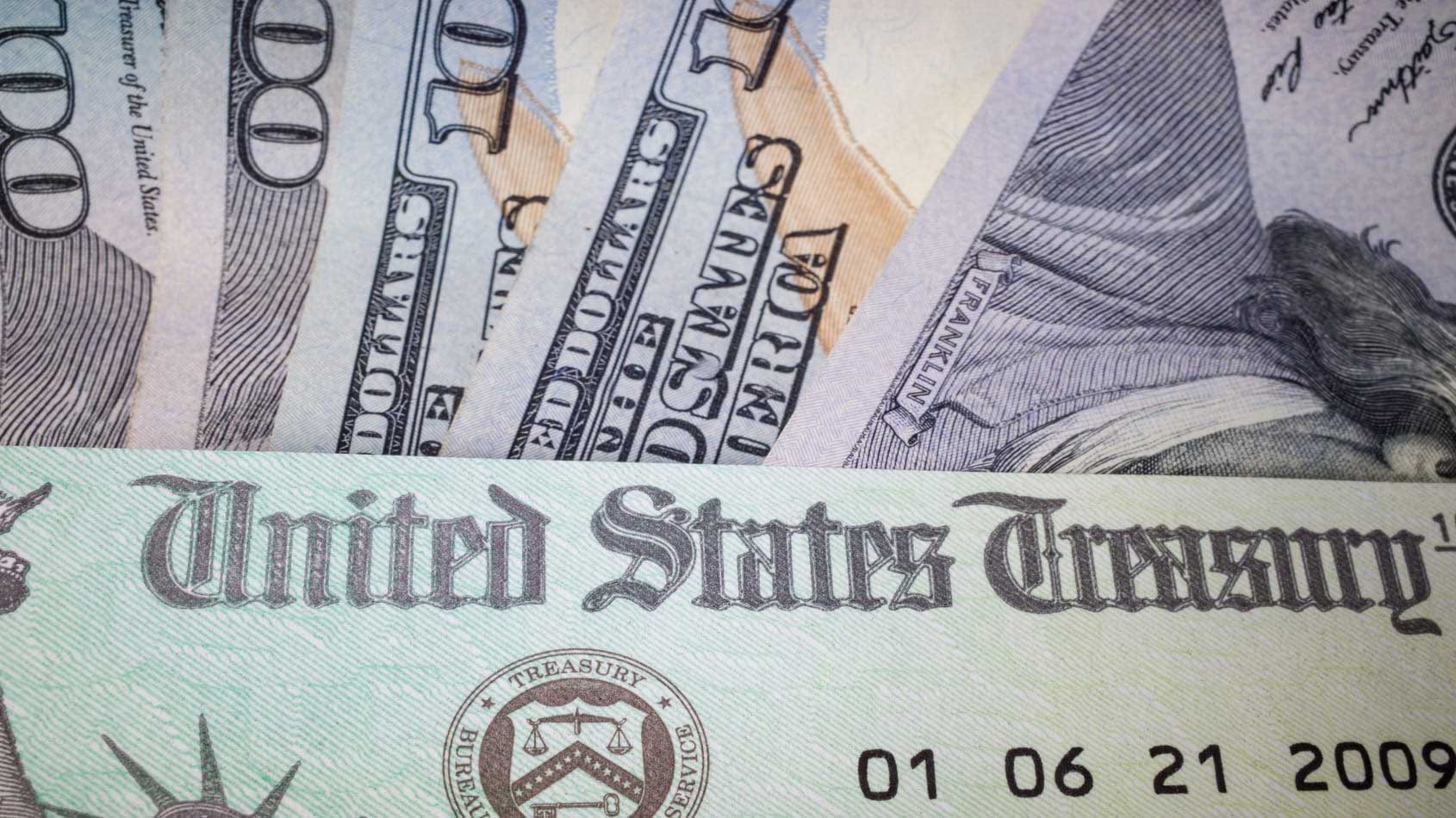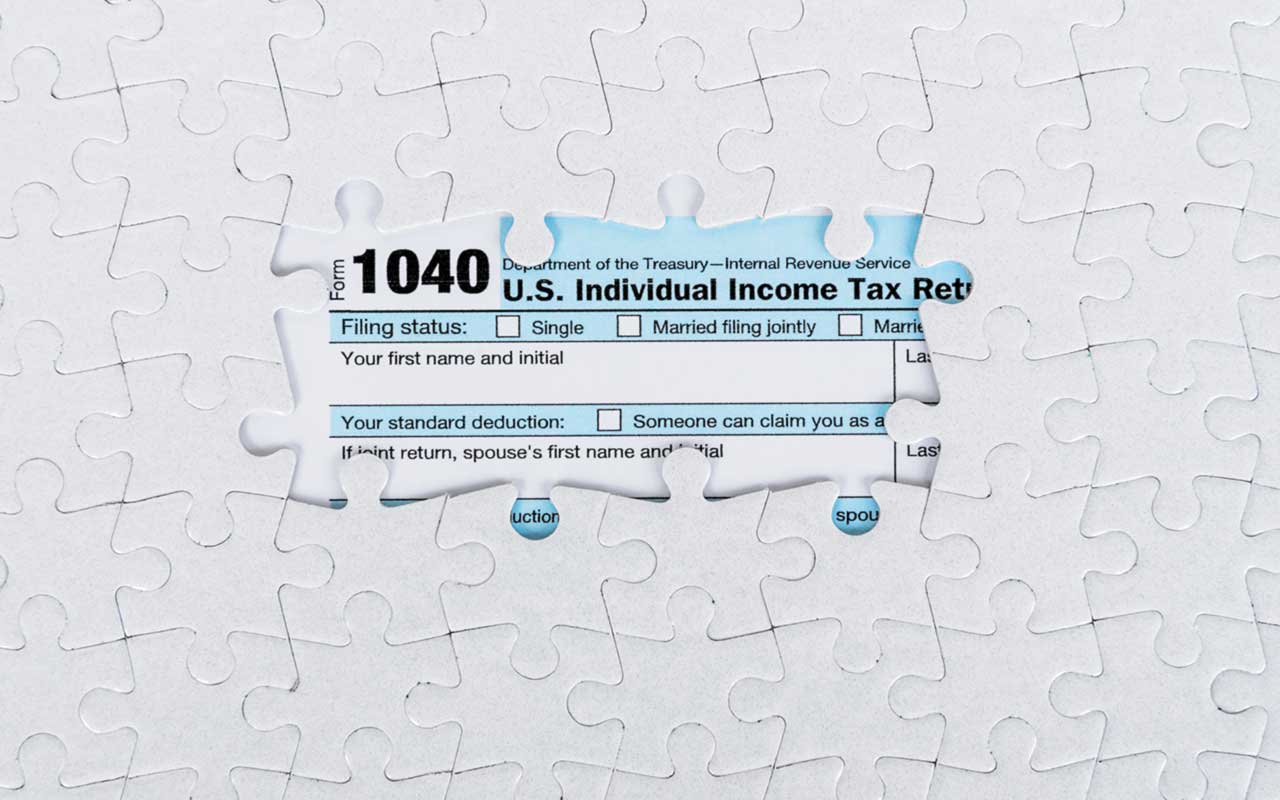State Taxes on the Ballot 2020 -- Pot, Real Estate and More
Kiplinger.com senior tax editor Rocky Mengle joins the Your Money's Worth podcast to discuss the significant tax questions at stake on this year's election ballot. Also, our hosts David Muhlbaum and Sandy Block have some bad news for retirement supersavers.

Profit and prosper with the best of Kiplinger's advice on investing, taxes, retirement, personal finance and much more. Delivered daily. Enter your email in the box and click Sign Me Up.
You are now subscribed
Your newsletter sign-up was successful
Want to add more newsletters?

Delivered daily
Kiplinger Today
Profit and prosper with the best of Kiplinger's advice on investing, taxes, retirement, personal finance and much more delivered daily. Smart money moves start here.

Sent five days a week
Kiplinger A Step Ahead
Get practical help to make better financial decisions in your everyday life, from spending to savings on top deals.

Delivered daily
Kiplinger Closing Bell
Get today's biggest financial and investing headlines delivered to your inbox every day the U.S. stock market is open.

Sent twice a week
Kiplinger Adviser Intel
Financial pros across the country share best practices and fresh tactics to preserve and grow your wealth.

Delivered weekly
Kiplinger Tax Tips
Trim your federal and state tax bills with practical tax-planning and tax-cutting strategies.

Sent twice a week
Kiplinger Retirement Tips
Your twice-a-week guide to planning and enjoying a financially secure and richly rewarding retirement

Sent bimonthly.
Kiplinger Adviser Angle
Insights for advisers, wealth managers and other financial professionals.

Sent twice a week
Kiplinger Investing Weekly
Your twice-a-week roundup of promising stocks, funds, companies and industries you should consider, ones you should avoid, and why.

Sent weekly for six weeks
Kiplinger Invest for Retirement
Your step-by-step six-part series on how to invest for retirement, from devising a successful strategy to exactly which investments to choose.
David Muhlbaum: When America votes, it doesn't just pick its leaders. It also makes a lot of direct decisions on tax policy. State taxes, that is. Senior tax editor Rocky Mengle joins us in our main segment to talk ballot initiatives across the country, including one that would close the Lebowski loophole. Yes, that's a reference to The Dude. Sandy and I will also discuss the new retirement savings limits and how the coronavirus pandemic may have actually improved the new-car buying experience. That's all ahead on this episode of Your Money's Worth. Stick around.
- Episode Length: 00:32:32
- SUBSCRIBE: Apple Google Play Spotify Overcast RSS
David Muhlbaum: Welcome to Your Money's Worth. I'm Kiplinger.com senior editor David Muhlbaum, joined by senior editor Sandy Block. Sandy, how are you?
Sandy Block: Doing great, David.
From just $107.88 $24.99 for Kiplinger Personal Finance
Become a smarter, better informed investor. Subscribe from just $107.88 $24.99, plus get up to 4 Special Issues

Sign up for Kiplinger’s Free Newsletters
Profit and prosper with the best of expert advice on investing, taxes, retirement, personal finance and more - straight to your e-mail.
Profit and prosper with the best of expert advice - straight to your e-mail.
David Muhlbaum: Good. We talked about numbers out of Washington a few weeks ago, the 2021 cost of living adjustment for Social Security. That's an important number for anyone who collects it. But today we've got some other numbers, numbers that affect many more people, people saving for retirement rather than in it.
Sandy Block: That's right. The IRS released its annual inflation-adjusted thresholds for retirement savings plans this week, and it's really not good news for supersavers. The amount you can stash in a tax-advantaged accounts, such as an IRA or 401(k), won't change in 2021. The maximum you can save in a 401(k) or other employer-sponsored retirement plan will remain at $19,500 if you're under 50, $26,000 if you're 50 or older. The maximum you can save in a traditional or Roth IRA is also unchanged, $6,000 or $7,000 if you're 50 or older.
David Muhlbaum: Okay. Now, when we talked about the COLA, we had a 1.3% increase, but here we have no change at all. If the COLA went up by 1.3%, why wouldn't these levels go up the same? Is there some kind of threshold?
Sandy Block: Well, I ran this by Rocky Mengle who will be joining us today and he's our tax expert, and basically what he told me is the IRS rounds. So, they're not going to change the threshold for a 1.3% change. That has happened before.
David Muhlbaum: Even though it'd be hundreds of dollars.
Sandy Block: Well, yeah, but they don't. Maybe this is to make accountants happy. I mean, in reality, most people don't even come close to that amount, but I've seen this every year. They don't say the threshold is $19,563. They say the threshold is $19,500, and maybe that's for simplicity's sake or whatever. But that's what it is. The IRS rounds, and this year, basically 1.3% is a rounding error.
David Muhlbaum: Got it. Not much, then. But yeah, I see your point about, for the accounting. Like X number of financial institutions don't have to go updating X number of forms, even if they're electronic. Saving some work. Now, you mentioned the term supersaver. What's that? Do you get to wear a cool costume?
Sandy Block: Well, maybe you should, if you're a supersaver. It is, well, by the time this comes out, it will be past Halloween, but we're recording this just before Halloween. But no, supersavers are people who saved the maximum amount. In reality, I mean, we follow these numbers very closely, but the reality is that most people don't come anywhere near saving the maximum that they can put in a 401(k) or even an IRA or a Roth. Although I think it's more common with an IRA or a Roth because you might have that amount. Most people don't save over $19,000.
David Muhlbaum: $6,000 or $7,000. Right.
Sandy Block: Yeah. $6,000 or $7,000 . . . but most people don't save $26,000, except for, and this, I think, includes a lot of our readers . . .
David Muhlbaum: Supersavers!
Sandy Block: Supersavers and older people, people who are at their peak earning years, maybe in their 50s, who qualify for the catch-up, know that retirement is out there and want to stash away as much as they can. These people do care about these thresholds.
David Muhlbaum: And it's not too late to save.
Sandy Block: No, it is not too late. In fact, if you haven't approached the threshold for 2020, which is the same as what it will be for 2021 in your 401(k), there is still time to ask your employer to take more money out of your paycheck. If you get a bonus, you could ask your employer to defer the bonus to your 401(k). As I always point out in our tax stories, contributing to a employer-sponsored plan or a deductible IRA, if you qualify for one, is one of the very few ways that people who don't itemize, and that's just about everybody, can cut their taxes. Because that money does reduce the amount of taxable income that you will have to pay taxes on when you file your taxes next year. So there is still time to put more money in your 401(k) and you actually have until April 15th to fund a IRA or a Roth IRA. The deadline for that is the tax deadline. But if you've got that money, go ahead and fund it now. That just gives it that much more time to grow.
David Muhlbaum: Next, we'll talk about ballot initiatives that could change what you pay in state taxes. Might include your state.
David Muhlbaum: We're back with Kiplinger senior tax editor Rocky Mengle to talk about the upcoming election. If those last two words made you flinch, don't despair, we are not discussing candidates of any party or, if you're listening after election day, the results. Remember, we recorded this in October. Rather, we're going to take a look at ballot initiatives across the country and we're going to narrow that even further by focusing on those with real pocketbook impact, tax measures. This is Kiplinger's Personal Finance, you betcha, and thanks for letting me get through all these disclaimers. Rocky, welcome.
Rocky Mengle: Hi. How are you doing?
David Muhlbaum: Another disclaimer, there are 17 states with tax initiatives on the ballot and we do not have time to get to each one today, but we do have a slideshow on the site that covers these thoroughly from Alaska to Washington. We'll put that in the show notes. So, Rocky, let's go right to a state that's home to a ton of people, some of whom might see their income taxes go up.
Rocky Mengle: Yeah, it sounds like you're talking about Illinois, huh?
David Muhlbaum: It's a big one.
Rocky Mengle: Yeah. Well, let's see. Currently, state law requires the Illinois personal income tax to be imposed at a flat rate, which right now is 4.95%. Now, the question on the ballot will ask the voters if they want to repeal that requirement and allow the state to enact a graduated income tax, that is, different rates for different income levels, and of course, the more you earn, the higher your tax rate under that type of system.
David Muhlbaum: But it's not a wholesale soup to nuts thing, right? This is going to be brackets above.
Rocky Mengle: Some above, some below.
David Muhlbaum: Ah, okay.
Rocky Mengle: Yeah. The way this is going to work is that actually, Illinois has already passed a bill that would dump the flat tax and impose a graduated rate starting in 2021, but it only takes effect if this ballot initiative is approved. So, if this passes, then the rates will go from 4.75 to 7.99%. That 7.99%, that would be the tenth highest top rate in the country.
Sandy Block: Not much of a break.
Rocky Mengle: No, it isn't much of a break at all. Some people will just, like I said, see a 4.75%. There's also a 4.9% rate in there. Most people will probably fall into one of those two tax brackets. So if you're in the 4.9%, if this passes, then you're just getting, basically, a pretty small tax cut.
Sandy Block: Rocky, how come this is being voted on? I mean, isn't this the state government, state lawmakers' job to make tax rates?
Rocky Mengle: Okay. Yeah. So, yeah, why is this a ballot question needed here? Well, it's because a constitutional amendment is required to change the flat tax law. That's in the constitution. Illinois voters must approve changes to the state's constitution, so that's why this is a ballot question.
David Muhlbaum: When they set up the flat tax, initially, they said, when they did that, they said, "You can't change it without a constitutional amendment."
Rocky Mengle: Right. So, they got the wheels rolling for getting this question on the ballot at the time that the tax rate bill was passed.
David Muhlbaum: Okay. I just wanted to come back to, you said, "Most people won't see much of a change." So, who does?
Rocky Mengle: Well, anyone, let's see, anyone making over $250,000 will see their tax rate go up. At that point, the rates go from 7.75% to 7.85%, and then to the 7.99%. Interestingly enough, the 7.99% rate -- the highest rate -- that'll work as a flat tax on all taxable income for single taxpayers with a taxable income over $750,000, or joint filers with income over a million dollars. So, they don't get the benefit of those marginal rates if you're in the very top of the bracket.
David Muhlbaum: It's like a threshold thing. So once you go over that, you get that rate applied to everything you make.
Rocky Mengle: Everything. Yeah. So that's a real killer there for wealthier people in Illinois, if that passes.
David Muhlbaum: So you think it's going to pass?
Rocky Mengle: My prediction is close, but yeah, I think it'll pass. I think the country's in a "let's tax the rich" mode and the polling shows it at least leaning for passage. So, yeah, I think it probably passes.
Sandy Block: Well, and Illinois has a lot of financial problems that I think would probably influence the vote as well. But Rocky, are there any other states with income tax proposals, because those seem like the most direct consequential taxes for state residents?
Rocky Mengle: Yeah. There are two. Arizona, Proposition 208 on the ballot. That would enact a 3.5% tax surcharge on singles with taxable income over $250,000, and joint filers with taxable income over $500,000. So, the highest rate there would jump from 4.5% to 8% starting in 2021. Again, 8%, that's a pretty high tax rate, tops rate.
David Muhlbaum: The key thing in there is that it's 3.55% surcharge. I just want to-
Sandy Block: Not a 3.5% rate. Yeah.
David Muhlbaum: Yeah. Not rate. I want to just make that really clear.
Rocky Mengle: Yeah. It really only applies to those upper income folks, and again, really effectively puts their rate up at 8%. The money used for that is supposed to go to educational funds that will mainly benefit teachers, improve teacher salaries, teacher mentoring and retention programs and other educated related things.
David Muhlbaum: That's interesting that Arizona is trying to make this surtax a dedicated thing for schools, as you said. It makes me think of California where their millionaires tax, like the last 1% that takes the total rate to 13.3%, it's part of the Mental Health Services Act. I guess that's part of how taxes increases like this are sold. They indicate these revenues are going to be for a particularly worthy purpose. As years go on, do they stay that way or does it all end up being fungible in the end?
Rocky Mengle: Well, I think it depends on how the law is written, how tight the language is. Just to give an example here in Maryland. A few years ago, they allowed casino gambling in the state and all the revenue from that, additional revenue, was supposed to go to education. But the law wasn't written really all that well and a lot of the money ended up just going into the general fund. So it really all depends on the language and how it's written up.
Sandy Block: Rocky, another thing we're seeing in a whole bunch of states is marijuana legislation and efforts to raise tax revenue as part of that, even in Mississippi. What's up with that?
Rocky Mengle: Yeah. Mississippi is trying to legalize medical marijuana. I want to emphasize that this isn't for recreational use in Mississippi, just medical use. Actually, there are two versions of the measure there in Mississippi, one of which would even restrict marijuana usage to the terminally ill. And then, of course, sales tax would apply to the sale of medical marijuana in Mississippi if this ballot question passes. And then there are also four other states that have ballot questions this year to legalize and tax the recreational use of pot. They're in Arizona, which has Proposition 207 to legalize marijuana and impose a 16% excise tax on pot sales. In Montana, if marijuana is legalized it would be taxed at 20% of the retail price.
Rocky Mengle: Up in New Jersey, the state's regular sales tax would apply to the sale of marijuana and additional local governments could potentially tax on their own sales tax as well. And then in South Dakota, voters can legalize and tax both the medical and recreational use of marijuana, and sales of marijuana would be taxed at 15% in South Dakota if that passes. And then it's not marijuana, but then there's also Oregon, which has a real groovy ballot question to legalize and tax psychedelic mushrooms and the tax there would be 15%.
David Muhlbaum: 15%. So, I mean, there are states out there like Colorado that have been doing this for quite a while now. Do you see, in these new proposals, any evolution in how states try to turn something that was illegal into a source of new revenue? What kind of balancing act are they pulling?
Rocky Mengle: Well, I don't know if there's any kind of evolution that I've picked up on in the way states go about trying to legalize and tax marijuana. But let me say a couple of things. First, taxes on marijuana don't bring in a ton of money. In several instances, the revenue is much less than what was originally expected. For instance, in 2019, California took in about $630 million from pot taxes. But for other states, it's much less, like in Colorado where we're at about 300 million. Now, of course any revenue is welcome, but these are small amounts in terms of overall state buckets.
Rocky Mengle: The second thing is that some people who've studied this believe that one of the reasons why marijuana tax revenues aren't higher is because many people who smoke pot are still getting their weed the old-fashioned way, through illegal sales. After all, street dealers don't charge tax and that might put a damper on tax revenues. That's something states that legalize and tax marijuana in the future might want to try to address, but maybe having taxes that aren't too high or too complicated might help with that.
David Muhlbaum: So, there's no such thing as an election without a whole raft of ballot initiatives in California. But this year we've got one that deals with something everybody loves to gossip about, which is the real estate of the rich and famous, which looks like that's most of what Proposition 19 is about. This is a one seriously involved proposal. Rocky, can you break it down, or at least the parts we should pay attention to?
Rocky Mengle: Yes, California's Prop 19. This ballot question would do a couple things like help lower property taxes for people 55 and older, but there's another provision that's getting even more attention because it clamps down on property tax breaks often used by the rich and famous. This tax break is being called the Lebowski loophole. I'll explain why in a second, okay. But this is a little technical, so bear with me for a minute as I lay it out for you. First, it's important to understand that there are two values placed on homes in California. There's the market value, which is how much your home is actually worth and the base year value, which is the values to calculate the annual property tax -- and we'll just call that the tax value. Now, the market value can go up by any amount in any year, and it often increases pretty quickly in California, or at least in some parts of the state. But on the other hand, under California law, the tax value can't increase more than 2% per year.
David Muhlbaum: Oh, this is the Proposition 13 thing.
Sandy Block: Proposition 13.
Rocky Mengle: This is Proposition . . . from the '70s. Good old Proposition 13. Yeah. Or part of it, anyway. Part of Proposition 13. So anyways, if your home's market value rises more than 2% per year, a gap develops between the market value and the tax value, and that gap can grow year after year if the market price keeps going up by more than 2% per year, which it typically is.
Sandy Block: Mostly it does. Yeah.
Rocky Mengle: Particularly in certain parts of California. But now this gap is a good thing for homeowners and the bigger the gap, the more the homeowner saves because property taxes are based on a smaller value. However, when the home is sold and there's a new owner, the home's tax value is reset to equal the market value. So there's no more gap to help the home's new owner. That's just some background. Now, under current California law, if your primary home is sold, inherited or otherwise transferred to your child or to your grandchild if their parents are dead, your tax value is transferred to your child or grandchild. In other words, the reset to market value is avoided, which keeps property taxes low for your child. If other property like a vacation home is sold or inherited, only the first million dollars of market value avoids the reset. Now, the problem arises in many people's eye when someone inherits their parents' primary residence, but then they turn the home in a rental property instead of moving into the home themself.
Sandy Block: Sweet. Uh-huh.
Rocky Mengle: Yeah. This is especially costly to California counties when the home is worth a lot of money, because the county is losing a lot of tax revenue. The problem, at least in the media, is also being tied to rich people because they're the ones inheriting a lot of expensive homes.
David Muhlbaum: This is coming back to Malibu, somehow.
Sandy Block: Yeah. And . . .
Rocky Mengle: Yeah. So . . ..
David Muhlbaum: Stay out of Malibu!
Rocky Mengle: Yeah. So, let's just go to the Lebowski loophole. According to the LA Times, this rule is being called the Lebowski loophole because Jeff Bridges, who starred in The Big Lebowski . . .
Sandy Block: The Big Lebowski.
Rocky Mengle: Yeah. He and his siblings advertised the rental of a Malibu beach front home that he and his, I guess, brothers and sisters inherited from their parents. They were renting it for $16,000 a month, even though the annual property tax for the houses is far less than that amount. So that's how this loophole got its nickname, the Lebowski loophole.
David Muhlbaum: And Proposition -- I've lost track -- 19?
Rocky Mengle: 19, yes.
David Muhlbaum: 19 would close that? That's one of the provisions.
Rocky Mengle: Yes. So we have rich people taking advantage of tax loophole and Proposition 19 would close the loophole by basically allowing the transfer of your tax value to your child or grandchild only if the child or grandchild lives in the home and uses it as their primary residence.
Sandy Block: So this tax proposition would bring the room together. But again, I go back to the question I raised earlier. Why are California voters voting on something so insanely complicated and so specific? Again, what are their lawmakers doing all day long?
Rocky Mengle: Well, first of all, I think ballot questions . . . they provide a way for the people to go around the state legislature and the governor and pass laws themselves. Over 100 years ago, California went in big for this form of direct democracy. There was a feeling then that the state government was especially corrupt and in the pocket of special interests. I guess that feeling persists today with many people. But there's also a legal reason why California has so many ballot questions each election, and that's because state law requires them for state constitutional amendments, certain statewide bond measures and to change previously approved voter initiatives. So if you passed one ballot initiative, you often get several more later just to modify them. For instance, back to Proposition 13, which was approved back in 1978, and it restructured the state's property tax system, blah, blah, blah. It has led to many other ballot questions over the years just to tweak it, like Proposition 19 on this year's ballot. That's really a tweak of an earlier initiative, so that's why you get a lot in California.
David Muhlbaum: The irony of it is you end up having this cottage industry of proposition management. It's almost like a shadow government. Companies will try to get enough signatures for their proposition and yeah, it's direct democracy, but it ends up creating its own system, as well.
Rocky Mengle: Yeah. We also tend to think of this as a West Coast thing in California, Washington, Oregon, Colorado. But for example, states like Massachusetts and Louisiana, Florida, they seem to have a fair number of ballot questions each election period, too. So it's not just a West Coast thing. There are a lot of them out West, but it's not isolated to the West.
David Muhlbaum: Right. Certainly there are many, many cases where there are local governments who will have ballot initiatives. That's the sort of thing that I always try have to do when I go in there. I usually pretty much have my mind made up on the stuff at the top, but then I get to this really long piece of legalese and I'm like, "Oh my God, I really should have looked this up. What am I voting on here?" So yeah, do your research.
Rocky Mengle: Yeah. That's why they have voter guides that they're sent out in advance to give you a heads up on those things.
David Muhlbaum: Well, Rocky, thanks for your insights. We're going to see how this all plays out and whether your taxes will go up. Thanks again.
Rocky Mengle: Okay. You're welcome.
David Muhlbaum: Okay, Sandy, I have a question for you. Someone did a survey that said 25% of Generation X respondents said they'd rather get a root canal than engage in this consumer practice.
Sandy Block: What is shop for a new car?
David Muhlbaum: Nice. You're still using the Jeopardy format even after Ryan's gone. Yeah, you're right. Shop for a new car. In fairness, that survey was done about five years ago, but I don't think the car buying process had gotten much more popular until . . . well, are you going to guess?
Sandy Block: What is coronavirus?
David Muhlbaum: Yes. What is coronavirus? Yeah, it has had an effect on how we buy cars. I mean, not just the question of how many and how much we're paying for them, but how the process gets done. In short, it pushed more of the process online, which is something many buyers, particularly younger ones, were clamoring for for years. I want to make a distinction here, though, between used cars and new cars. In the used car market, which isn't as hung up on the car maker franchise business model, online shopping is a definite thing. It's been for years. Carvana, Shift are a couple of the big names in this field. But new car shopping was slower to respond. I wrote a piece about this a year or so ago where I tried as best as I could to be an introvert new car shopper. I wanted to see how close you can get to buying a new car at a reasonable price with as little actual human interaction as possible. But again, this was last year, when no one knew what social distancing was.
Sandy Block: Right. That just meant you were being rude or had decided to ditch Facebook.
David Muhlbaum: Yeah. I mean, I might be a little rude, but okay. But what I found was you could definitely roam dealer inventory. You could look for specific models that suited your needs. But when it came down to an actual price, sometimes they would do this thing where they'd put up a price and they'd say, "Call for a better price." Well, they didn't say better but, call for actual price. You're like, "Okay, so that's not really the price, is it, huh?" But the point was the dealer still wanted you to come on down -- or if you put in an email or a phone number, God help you. Here comes the deluge.
Sandy Block: Right. Anyone who's bought a new car knows why that happens. Because they want to get you in that little cubicle with the nice but incredibly insistent lady who's going to sell you floor mats and floor mat insurance and financing and rust proofing and all this stuff you never knew you needed until you got in the cubicle.
David Muhlbaum: Right. Because that's the F&I office. That's one of the many ways of car dealers make money on a sale. One is sell you the car. Another is sell you stuff for the car and how to pay for the car. That latter stage, F&I as it's called, that was the hardest to translate online.
Sandy Block: Yeah. But why? I mean, why couldn't they put those things in a shopping interface? Like, okay, floor mats, check here. Floor mat insurance. And you'd be like, "Nah, move on."
David Muhlbaum: Well, they can, and back to the coronavirus, they have been, but dealers were really reluctant to put this part online. I think that's because people would tend to say, "Nah," to more of these offerings than they would if they were in the cubicle with the very insistent lady.
Sandy Block: Right. Because these things oftentimes are not very good deals, and if you have time to think about them and maybe Google around, you'd say, "No, no, I don't need that."
David Muhlbaum: Yeah. I mean, things like the hard bits, the actual physical products like roof rack or floor mats that they want to sell you, they're generally pretty high quality stuff that has the approval of the manufacturer, et cetera. Yeah, you could probably beat the price on them online, but the appeal has always been that all those aftermarket purchases can get enrolled into the financing. So, why not get the floor mat protection policy, too? It's just another $5 a month. What if someone stole your floor mats?
Sandy Block: Ah, you do a very good insistent cubicle lady, David -- but okay, back to what about the coronavirus?
David Muhlbaum: Okay. So, right. So when the virus hit and shut down followed, dealers were in a pickle. If your lifeblood is selling cars and you can't sell cars, well, that's bad. The car dealers even successfully lobbied to be considered an essential business, but the customers still didn't want to come back into the cubicle with the very nice lady. I mean, she may be very nice and all, but there's a pandemic going on. So the dealers, by and large, bit the bullet and did what they needed to do to move the process online or at curbside. The software for this has been around. In short, things got better for the introvert.
Sandy Block: So, big question. Do you think things will stay this way?
David Muhlbaum: I'm not sure. I mean, anecdotally, I'm hearing about things going back to normal, which may not be good in this case. I don't know. My neighbor just traded in her Honda Accord for another one, new, and other than wearing masks and making appointments, the process she described to me sounded very old school. But the thing is, younger shoppers are behind a lot of the current surge at sales -- and they're the ones who are most into making the purchases online. It's really all they've ever known. Why wouldn't you buy a car online? Because, yeah . . . so I don't know. Will they collectively have the power to make a lasting change? I mean, speaking as an older introvert, I sure hope so.
Sandy Block: Yeah, me, too. Because actually, one of my cars is getting pretty old and I would love to not have to deal with the cubicle lady. So fingers crossed, David.
David Muhlbaum: That will just about do it for this episode of Your Money's Worth. I hope you enjoyed it. For show notes and more great Kiplinger content on the topics we discussed on today's show, visit Kiplinger.com/podcast. You can stay connected with us on Twitter, Facebook or by emailing us at podcast@kiplinger.com. If you like the show, please subscribe to Your Money's Worth wherever you get your podcasts, and please give us a rating when you do. Thanks for listening.
Links and resources mentioned in this episode:
Profit and prosper with the best of Kiplinger's advice on investing, taxes, retirement, personal finance and much more. Delivered daily. Enter your email in the box and click Sign Me Up.

In his former role as Senior Online Editor, David edited and wrote a wide range of content for Kiplinger.com. With more than 20 years of experience with Kiplinger, David worked on numerous Kiplinger publications, including The Kiplinger Letter and Kiplinger’s Personal Finance magazine. He co-hosted Your Money's Worth, Kiplinger's podcast and helped develop the Economic Forecasts feature.
-
 Dow Adds 1,206 Points to Top 50,000: Stock Market Today
Dow Adds 1,206 Points to Top 50,000: Stock Market TodayThe S&P 500 and Nasdaq also had strong finishes to a volatile week, with beaten-down tech stocks outperforming.
-
 Ask the Tax Editor: Federal Income Tax Deductions
Ask the Tax Editor: Federal Income Tax DeductionsAsk the Editor In this week's Ask the Editor Q&A, Joy Taylor answers questions on federal income tax deductions
-
 States With No-Fault Car Insurance Laws (and How No-Fault Car Insurance Works)
States With No-Fault Car Insurance Laws (and How No-Fault Car Insurance Works)A breakdown of the confusing rules around no-fault car insurance in every state where it exists.
-
 PODCAST: Decoding ESG Investing with Ellen Kennedy
PODCAST: Decoding ESG Investing with Ellen KennedyBecoming an Investor Environmental, social and governance investing is simpler than it sounds, and has a profitable track record to boot.
-
 PODCAST: National Taxpayer Advocate Erin M. Collins Wants to Help
PODCAST: National Taxpayer Advocate Erin M. Collins Wants to HelpFinancial Planning Your tax dollars are at work funding a government bureau to help you deal with the IRS. Strange but true! Also, the price of Amazon is going up.
-
 PODCAST: The “Gray Resignation” with Liz Windisch
PODCAST: The “Gray Resignation” with Liz WindischMaking Your Money Last Pandemic pressures (and high stock and real estate values) are leading many to try to move up retirement. Plus, tax-filing season gets under way.
-
 PODCAST: Get the Most from the Expanded Child Tax Credit
PODCAST: Get the Most from the Expanded Child Tax CreditTax Breaks The latest government stimulus is a much-more generous child tax credit, with a new twist: The IRS is going to send you money each month, if you're eligible. Also, what marrying will do to your taxes.
-
 PODCAST: Max Out Your Stimulus Check with Rocky Mengle
PODCAST: Max Out Your Stimulus Check with Rocky MengleTax Breaks You probably know you're getting a stimulus check, but did you know you can have an impact on its amount? Senior tax editor Rocky Mengle talks about the moves you can make to upsize your stimulus. Also, will your state raise — or lower — your taxes.
-
 PODCAST: Why Pay Money to File Your Taxes?
PODCAST: Why Pay Money to File Your Taxes?Tax Breaks Far more people could be filing their federal returns for free; maybe even their state taxes. Also, the latest from Brandon Copeland and the not-so-secret perks of stock ownership.
-
 PODCAST: Taxes and Insurance When Working from “Home”
PODCAST: Taxes and Insurance When Working from “Home”Tax Breaks Working remotely in a new state, maybe even a new country? That can lead to complications, particularly when it comes to taxes. Also: why the IRS is starting tax season late this year, and a check-in on student loan policies in the new administration.
-
 PODCAST: Taxes on Retirees — What’s New
PODCAST: Taxes on Retirees — What’s NewBudgeting In this episode of Your Money's Worth, senior tax editor Rocky Mengle talks about the latest update of the Kiplinger Retiree Tax Map. Will states with declining revenues make life harder on retirees? Also, the Biden stimulus plan and the hazards of patent scams.

